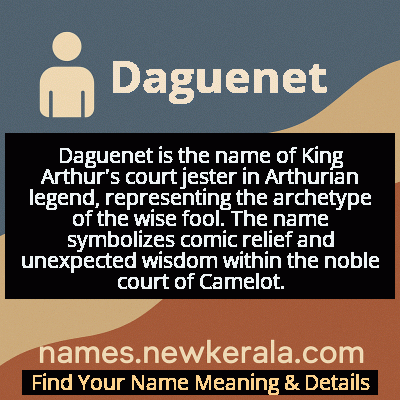Daguenet Name Meaning & Details
Origin, Popularity, Numerology Analysis & Name Meaning of Daguenet
Discover the origin, meaning, and cultural significance of the name DAGUENET. Delve into its historical roots and explore the lasting impact it has had on communities and traditions.
Name
Daguenet
Gender
Male
Origin
Arthurian
Lucky Number
5
Meaning of the Name - Daguenet
Daguenet is the name of King Arthur's court jester in Arthurian legend, representing the archetype of the wise fool. The name symbolizes comic relief and unexpected wisdom within the noble court of Camelot.
Daguenet - Complete Numerology Analysis
Your Numerology Number
Based on Pythagorean Numerology System
Ruling Planet
Mercury
Positive Nature
Adventurous, dynamic, curious, and social.
Negative Traits
Restless, impatient, inconsistent, prone to indulgence.
Lucky Colours
Green, white.
Lucky Days
Wednesday.
Lucky Stones
Emerald.
Harmony Numbers
1, 3, 9.
Best Suited Professions
Sales, marketing, travel, entertainment.
What People Like About You
Versatility, charisma, adventurous spirit.
Famous People Named Daguenet
Daguenet
Court Jester
Served as King Arthur's official fool, known for his comic antics and unexpected moments of wisdom
Daguenet le Fol
Knight-Errant
Appears in various Arthurian romances as a knight who, despite his foolish reputation, occasionally demonstrates unexpected courage
Sir Daguenet
Companion Knight
Featured in the Prose Tristan as a knight who accompanies Tristan on various adventures despite his reputation for foolishness
Name Variations & International Equivalents
Click on blue names to explore their detailed meanings. Gray names with will be available soon.
Cultural & Historical Significance
Throughout Arthurian literature, Daguenet's role evolves from mere comic relief to a more complex figure who challenges conventional notions of honor and wisdom. In some versions, he is knighted by Arthur as a joke, yet he takes his knighthood seriously, creating an interesting tension between his foolish appearance and his earnest attempts at chivalry. This duality makes him a fascinating character study in medieval literature's exploration of appearance versus reality, and the idea that true nobility might reside in unexpected places. Daguenet's presence in the Arthurian canon reminds readers that even the most idealized society needs laughter, humility, and the perspective that comes from outside conventional wisdom.
Extended Personality Analysis
Characters named Daguenet are typically portrayed as possessing a unique blend of apparent foolishness and unexpected wisdom. They often exhibit cheerful, lighthearted personalities with a tendency toward comic behavior and playful antics that entertain those around them. Despite their reputation for foolishness, Daguenet figures frequently demonstrate moments of surprising insight or accidental wisdom, embodying the archetype of the 'holy fool' who sees truth more clearly than those burdened by conventional thinking. Their personality often includes loyalty to their lord or companions, a certain innocence or naivete about the world's complexities, and an ability to diffuse tense situations through humor.
The Daguenet character typically lacks the pride and self-importance of more conventional knights or courtiers, making them approachable and often more genuinely connected to common people and their concerns. This humility, combined with their comic nature, allows them to serve as a mirror to society, reflecting both its virtues and absurdities without malice. While they may be the subject of laughter, they rarely take offense, understanding their role in the social fabric. Their foolishness is often strategic - a way to navigate complex social situations or speak uncomfortable truths under the guise of comedy. This makes the Daguenet personality not merely simple-minded, but rather strategically simple, using apparent foolishness as both protection and tool for genuine connection and truth-telling.
Modern Usage & Popularity
The name Daguenet remains extremely rare in modern times, primarily appearing in historical fiction, Arthurian scholarship, and among enthusiasts of medieval literature. It has never achieved significant popularity as a given name in any era, maintaining its status as a distinctly literary and historical name. Contemporary usage is almost exclusively limited to fictional works, gaming characters in Arthurian-themed games, or as a scholarly reference. The name's association with foolishness, while charming in literary context, has likely prevented its widespread adoption as a given name. However, it occasionally appears in fantasy literature and role-playing games where creators draw inspiration from Arthurian legends, and it maintains a niche appeal among those seeking unique names with deep literary roots.
Symbolic & Spiritual Meanings
Daguenet symbolizes the complex relationship between wisdom and foolishness, serving as a reminder that true insight often comes from unexpected sources. The name represents the archetype of the 'wise fool' who, unburdened by social conventions and intellectual pretensions, can perceive truths that escape more 'sensible' people. Symbolically, Daguenet embodies humility, comic relief as a necessary balance to seriousness, and the idea that laughter and foolishness have their own kind of wisdom. The character often serves as a foil to the pride and self-importance of knights and nobles, representing the value of maintaining childlike wonder and perspective even in sophisticated environments. In broader symbolic terms, Daguenet represents the necessary role of humor and lightheartedness in even the most serious undertakings, and the truth that wisdom sometimes wears the mask of folly.

